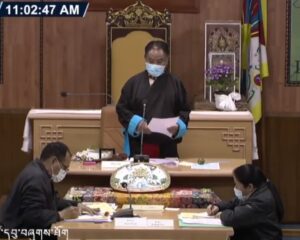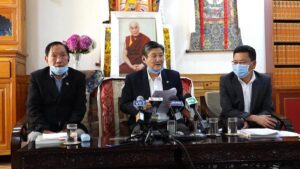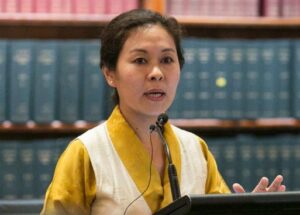
Speaker Pema Jungney during the session
The 10th and the final session of the 16th Tibetan Parliament-in-Exile (TPiE) concluded on March 27. In addition to discussing the departmental budget reports, the 12-day session saw some major developments which provoked public controversy in the Tibetan diaspora.
On the 10th day of the session, a resolution was passed to impeach the Chief Justice Commissioner Sonam Norbu Dagpo, and Justice Commissioners Karma Damdul and Tenzin Lungtok of the Tibetan Supreme Justice Commission (TSJC), from their posts with immediate effect. The vote was by means of a secret ballot; 31 members voted in favour of the impeachment, 10 against. The reason quoted for the removal of the Justice Commissioners was to “protect the Charter”.
In September last year, the 10th Parliamentary Session due to be held that month was cancelled by the TPiE Standing Committee in the face of the worsening situation regarding the Covid-19 pandemic and risk of infection. The TSJC revoked the voting rights of the 11 Standing Committee members for their action cancelling the session. TSJC argued that parliament sessions were held in Himachal Pradesh and neighbouring states despite the pandemic, and stated that the postponement of the Tibetan parliament session was against the Charter.

Chief Justice Commissioner Sonam Norbu Dagpo (center), Justice Commissioner Karma Damdul (left), and Justice Commissioner,Tenzin Lungtok (right)
In response to the impeachment, the Justice Commissioners held a press conference: “We haven’t violated any law. I think it is important for the TPiE Speaker Pema Jungney and 11 MPs in the Parliamentary Standing Committee to take the historical responsibility for such a move,”said Chief Justice Commissioner Sonam Norbu Dagpo, as quoted in a report by phayul.
The decision to remove the Justice Commissioners has enraged a section of the exile Tibetan community who have taken to social media to express their dissatisfaction.

Kyinzom Dhongdue
Kyinzom Dhongdue, a member of the Tibetan Parliament, issued a statement condemning the ousting of the Justice Commissioners, calling the move “unwise” and “unjust”. She wrote that it “sets a dangerous precedent for MPs to overreach their parliamentary powers and privileges.”
In a separate resolution, a majority vote was passed to the effect that all Central Tibetan Administration officials should wear traditional dress at all times while in the office; currently they wear traditional dress only on Wednesdays which is not mandatory. Tibetan visitors to CTA offices will be asked to do the same. The resolution was a private member’s draft bill, tabled by Khenpo Jamphel Tenzin and seconded by Thupten Gyaltsen.
Regarding the CTA’s Middle Way policy, Dolma Tsering suggested that, given that the official stance of the CTA is the Middle Way Approach, it is inappropriate for the slogan “Bhod Gyalo” (Victory to Tibet/Free Tibet) and the Uprising Day song to be used at official events. Her comment sparked an angry response; Sikyong Lobsang Sangay, leader of the CTA, replied that use of the slogan and song does not undermine CTA policy.




 Print
Print Email
Email